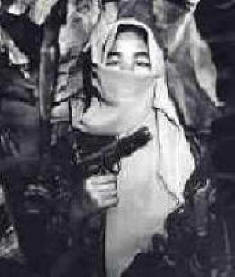Cut Intan is 23 years old, five-feet-nothing tall and -- like the 24 young women under her command -- trained to kill. She belongs to the elusive ''widows' battalion'' of the Free Aceh Movement (GAM), a 15,000-strong rebel army fighting for independence in Aceh, a rugged, jungly province on the northernmost tip of Indonesia's vast archipelago. ''We all feel a duty to fight for our land and for our ancestors,'' says Cut Intan.
Once a powerful sultanate and a center of Muslim learning, Aceh was colonized in the 1870's by the Dutch, who suffered thousands of casualties. The ferocity of Acehnese warriors -- women included -- was legendary. The wives of two Acehnese sultans led men into battle, and a female admiral once set sail with 500 warships and 40,000 men under her command. Today, GAM is vastly outgunned by the Indonesian military, which has razed countless Acehnese villages as collective punishment for rebel attacks. The fact that Acehnese women feel compelled to take up arms indicates how bitter the conflict has become. Most of the female guerrillas are in their early 20's. Like the great majority of Acehnese women, the widows wear head scarves that leave their faces exposed. (The women pictured here pulled their scarves over their noses to protect their identities.)

Mariana
joined the group two years ago at
16, ''to defend our country from the Indonesian colonialists.'' She took
part in a GAM ambush of an army truck. ''Everyone in the truck was
killed,'' she says, studying the flaking red varnish on her toenails.
''Fifteen of them.''
|
Cut
Intan
still looks like an adolescent yet
leads a unit of two dozen women ''willing to die for Aceh.'' Her
women -- part of a force of 300 to 400 fighters -- also gather
information on Indonesian troop movements. ''We can find out when
the T.N.I.'' -- the Indonesian military -- are sweeping a particular
village and inform the local GAM command. Then they're ready for
them.'' It is an exceedingly dangerous line of work. Recently, she
says, Indonesian soldiers captured five members of another women's
unit. ''We've found the bodies of three, but two others are still
missing.'' She doesn't hold out much hope of ever seeing them alive.
Dangerous though it is, the intelligence gathering is a matter of
life-and-death necessity, given the brutality of the Indonesian
military. Last year alone, more than a thousand people died in Aceh,
most of them civilians who found themselves in the wrong place at
the wrong time. |
Indonesia is the world's largest Muslim country, and its recently elected president, Megawati Sukarnoputri, quickly pledged support for the American-led war on terrorism. At the same time, however, her Indonesian troops were conducting their own campaign of terror in Aceh, massacring more than 30 plantation workers. A few days later, a mass grave containing 48 badly decomposed bodies was unearthed. While its people are devout Muslims -- Islam arrived in Aceh about a thousand years ago -- GAM insists that its struggle is political, not religious. Western analysts agree and suggest that Jakarta labels the Acehnese Islamic ''fundamentalists'' only to justify its brutal tactics. The generals who helped bring President Megawati to power consider it a sacred duty to keep Aceh part of Indonesia. With the cover provided by the war on terrorism, Indonesia is now widely expected to try to crush all resistance in its most turbulent province
|

Fatima,
like many of the women, is not actually a widow. But most have lost family
members to the war, and since many are married to GAM rebels, the prospect
of widowhood is never far away. ''They killed my brother in front of my
own eyes,'' says Fatima, who at age 20 is younger than her well-polished
M-16. ''They took his body and threw it away somewhere. The hardest part
is that I have never found it.'' Fatima joined the widows' battalion in
the face of rapidly escalating abuses by Indonesian soldiers. ''They
terrorize us more often now,'' she says. ''They tell us Aceh will never be
independent. They tell us they will not let it happen."'


